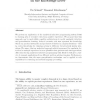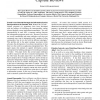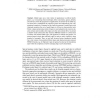46 search results - page 9 / 10 » Plausibility Structures for Default Reasoning |
COGSR
2011
13 years 11 days ago
2011
We present an application of the analytical inductive programming system Igor to learning sets of recursive rules from positive experience. We propose that this approach can be us...
TACS
2001
Springer
13 years 10 months ago
2001
Springer
The state of the practice in object-oriented software development has moved beyond reuse of code to reuse of conceptual structures such as design patterns. This paper draws attenti...
FLOPS
2006
Springer
13 years 9 months ago
2006
Springer
What will a definitive programming language look like? By definitive language I mean a programming language that gives good soat its level of abstraction, allowing computer science...
CJ
2006
13 years 5 months ago
2006
s the development of an abstract description of what there is in the world in an application-independent form. This paper argues that attempts to support information systems intero...
KI
2008
Springer
13 years 5 months ago
2008
Springer
Abstract. Modal logics see a wide variety of applications in artificial intelligence, e.g. in reasoning about knowledge, belief, uncertainty, agency, defaults, and relevance. From ...



